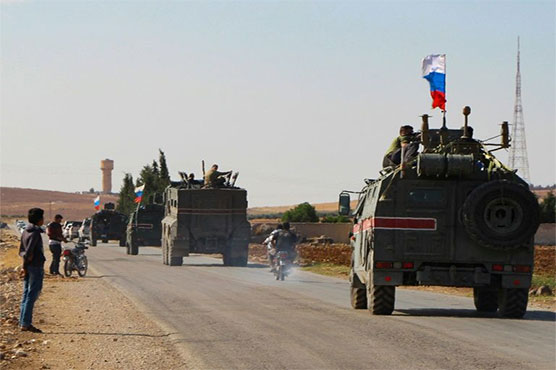Kurdish forces start Syria-Turkey border pullback

Kurdish forces in northeastern Syria left several positions along the extensive border with Turkey.
QAMISHLI (AFP) - Kurdish forces in northeastern Syria left several positions along the extensive border with Turkey on Thursday, complying with a deal that sees Damascus, Ankara and Moscow carve up their now-defunct autonomous region.
Even as troops withdrew, the Kurds top commander threw his weight behind a German-led plan for an internationally secured security zone in the country s north.
Russian forces have started patrols along the flashpoint frontier, filling part of the vacuum left by a US troop withdrawal that effectively returned a third of the country to the Moscow-backed regime of President Bashar al-Assad.
An AFP correspondent saw a Russian patrol set off from the town of Qamishli westwards along the Turkish border flying the country s flags, accompanied by Kurdish security forces.
The Russian defence ministry said the patrol covered "more than 60 kilometres" (37 miles) between Qamishli and the town of Amuda.
US President Donald Trump has praised the agreement reached in Sochi between NATO member Turkey and Russia, and rejoiced that US personnel were leaving the "long blood-stained sand" of Syria, leaving just a residual contingent behind "where they have the oil".
The deal signed in the Black Sea resort by Syria s two main foreign brokers gives Kurdish forces until Tuesday to withdraw to a line 30 kilometres from the border.
The Syrian Observatory for Human Rights reported that the Kurdish-led Syrian Democratic Forces (SDF) had pulled out of some areas at the eastern end of the border on Thursday.
Fighters from the Kurdish People s Protection Units (YPG) -- the main component of the SDF -- remained in many positions along the 440-kilometre border, said Observatory head Rami Abdel Rahman.
The Britain-based war monitor also reported clashes near the town of Tal Tamr between SDF fighters and some of the Syrian former rebels paid by Turkey to fight ground battles.
SDF commander Mazloum Abdi on Twitter accused the Turkish-led forces of violating the truce on the eastern front of Ras al-Ain.
"The guarantors of the ceasefire must carry out their responsibilities to rein in the Turks," he said.
NATO defence ministers slammed Turkey for its military operation in Syria on Thursday, at the start of a two-day meeting in Brussels.
Secretary General Jens Stoltenberg said the ministers agreed to "maintain our unity in the fight against ISIS", using another acronym for the Islamic State group.
At the meeting Germany presented an idea floated this week of international troops being deployed to create a security zone in northeast Syria.
The plan has been met tepidly by Germany s allies because of the situation on the ground and the need for a UN mandate, but the SDF commander welcomed it.
"We demand and agree to" the idea, Abdi told reporters.
There is no indication the plan will receive backing from Turkey or UN Security Council member Russia, which has emerged as the undisputed main foreign power in Syria following the US withdrawal.
Russian and Syrian government forces were deploying across Kurdish heartlands Thursday.
Kurdish forces had already vacated a 120-kilometre segment of the border strip -- an Arab-majority area between the towns of Ras al-Ain and Tal Abyad.
The SDF withdrawal from that area came after Turkey and its Syrian proxies launched their deadly cross-border offensive on October 9.
Turkish President Recep Tayyip Erdogan, who is embattled on the domestic political front, hopes to use the pocket to resettle at least half of the 3.6 million Syrian refugees his country hosts.
Under the Sochi deal, the area will remain under the full control of Turkey, unlike the rest of the projected buffer zone which will eventually be jointly patrolled by Turkey and Russia.
But UN envoy to Syria Geir Pedersen told Swiss news agency ATS that he hoped the ceasefire brought about by the Russian-Turkish deal would hold, but stressed the deal and the joint patrols "must be temporary".
Some 300,000 people have fled their homes since the start of the Turkish offensive and many Kurds among them seem unlikely to return.
US forces pulled back from the border area earlier this month, a move the Kurds saw as a betrayal.
Kurds, who had built an autonomous administration in Syria over the course of the country s war, had hoped that the sacrifices they made to help crush the IS "caliphate" would win rewards.
But Trump has been keen to keep a promise to remove his troops from Syria, where IS territorial control collapsed in March but where conflict continues.
"Let someone else fight over this long blood-stained sand," he said Wednesday.
The US pullout has meanwhile greatly empowered President Bashar al-Assad s regime as well as its Russian ally.
"Assad is getting back a third of Syria s territory without firing a shot," geographer and Syria specialist Fabrice Balanche said.
Some US forces remain in eastern districts of Syria, where government forces have been deploying but have not yet re-established full control.

